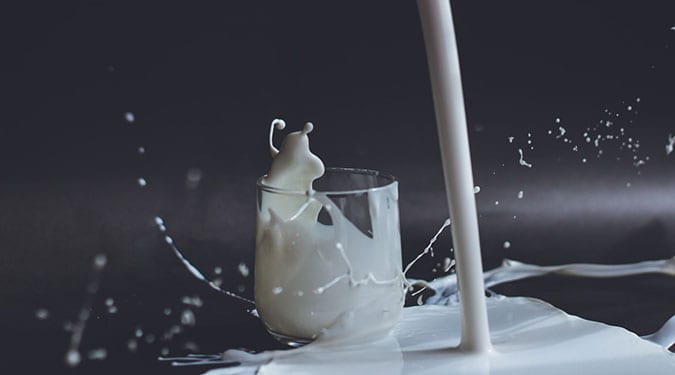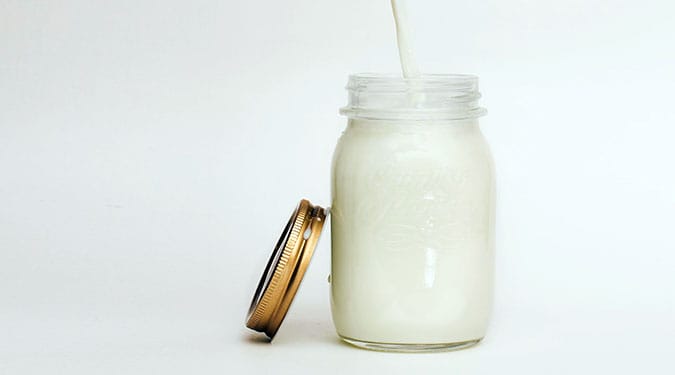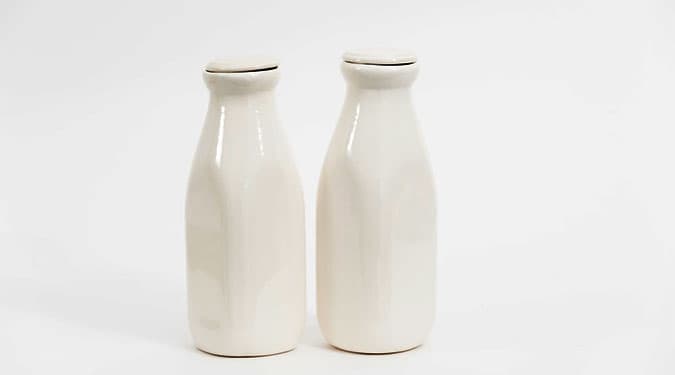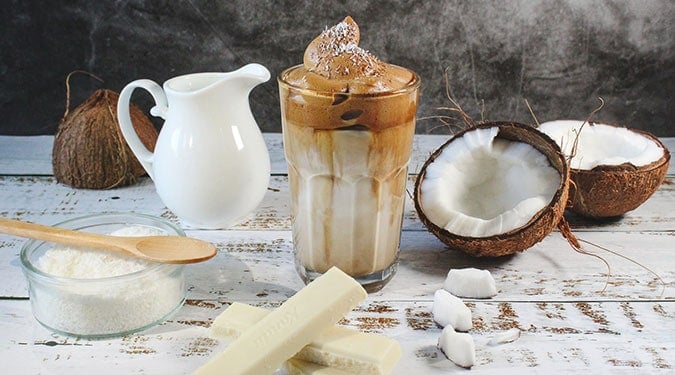In the caffeine world, coffee is king. But coffee’s trusty sidekick, milk, is often overlooked.
From cappuccinos to lattes, the majority of our favorite specialty brews are concocted with milk.
You might like your coffee black, or you might love milk-based drinks. Nonetheless, if you’re a coffee aficionado, it’s essential to understand the important role milk plays.
In this article, we explore the health benefits of milk and the best types of milk for coffee.
Coffee and Milk: A Love Story
Milk and coffee are a dynamic duo. While the thought of espresso mixed with orange juice may not water your mouth, milk is the perfect companion to add that delectable creaminess. And it’s all thanks to chemistry.
Milk’s molecular makeup of fat and protein is what makes it coffee’s soulmate.
The fat globules in milk do not degrade or oxidate, coating the tongue and reducing the coffee’s bitter taste and acidity.

Then there are the two superstar milk proteins—whey and casein. These proteins are an important factor in creating microfoam when heated, generating a distinctive taste when fused with hot espresso to make cappuccinos and lattes.
So as you can see, putting milk in coffee was meant to be. But this begs the next question: what is the best milk to put in coffee?
What is the Best Milk for Coffee?
Baristas know that the more fat in the milk, the creamier and sweeter the coffee will taste. That’s why if you don’t specify the type of milk you want in your coffee at the cafe, the barista will automatically reach for the whole milk.
Regarding how much milk to put in coffee depends on your personal preference. But, generally, lattes contain 1-2 oz of espresso with 8-15 oz of steamed milk, while cappuccinos have 2 oz of espresso with 2 oz of steamed milk.
Whole Milk

Whole milk is the favorite type of milk for coffee due to its 4% fat content. This lends the creamy, thick texture that specialty drinks are coveted for.
It’s also the closest you can get to a latte or cappuccino if you don’t have a frothing system at home.
But people who are on diets probably don’t consider whole milk as the healthiest milk for coffee due to the fat content. If that’s the case, then reduced-fat or fat-free can still be used to brew a decent specialty drink.
Reduced-Fat Milk

Reduced-fat milk has 1-2% fat, causing it to lose some of the thickness and sweetness that make whole milk so delicious in coffee.
This tends to make the coffee taste watery instead of creamy, but the benefit here is that it’s considered a healthier alternative to whole milk.
Skim Milk

Skim milk or fat-free milk takes the cake for being the healthiest dairy option, but when steamed, it’s drier and denser for a more distinct coffee flavor.
One interesting thing to note is that when you foam skim milk, it’s not as fluffy but has a sweeter flavor that whole and reduced-fat milk don’t give off. Some coffee drinkers prefer this!
Cream

While half-and-half has 12% fat and heavy cream has a whopping 38% of fat, you get a thick, rich coffee drink that begs for just a dash of dairy to balance out the flavors and texture.
Too much, and you may as well not be drinking coffee because you won’t taste it!
Health Benefits of Coffee with Milk
Out of the milk types we discussed, skim milk might be considered the healthiest milk to put in coffee due to its fat-free composition.
But health is relative, and while one might be watching their fat content, another person might say that fresh, organic whole milk is more nutritious. It all comes down to personal health and preference.
Coffee, on the other hand, has a plethora of health benefits. But is milk in coffee bad for you?
Actually, the pros outweigh the cons. Here are some of the health benefits of coffee with milk.

Milk in Coffee Does Not Affect Polyphenols
Polyphenols are antioxidants found in coffee that help promote good overall health. Studies show that when milk is mixed with coffee and consumed, the milk does not affect how polyphenols enter the body.
However, it’s interesting to note that non-dairy varieties slowed down the polyphenols, although it didn’t change how they impact the body as a whole.
Milk in Coffee Is Better to Drink in the Evening
If you have trouble falling asleep at night, you may want to add milk to your coffee. That’s because drinking black coffee gives you more mental awareness and energy since the milk does not inhibit caffeine.
Instead, drink black coffee in the morning to get the most out of your day, then it will be easier to fall asleep at night.
Milk in Coffee Doesn’t Help Weight Loss
We already know that one of the disadvantages of coffee with milk is that it may not help with weight loss. Whole milk and cream are the main culprits due to their higher fat content.
If you’re determined to lose weight, the best option is to drink black coffee since it has significantly fewer calories than coffee with milk.
Milk in Coffee Can Help Reduce Acidity
If your stomach is sensitive to the acidity in black coffee, then adding milk can reduce the high PH level that causes discomfort.
Milk in Coffee May Reduce the Risk of Oesophageal Cancer
Research shows that drinking hot coffee may lead to esophageal cancer. Drinking coffee that is too hot increases the risk of burning the esophagus tissues, leading to the formation of malignant cells.
Milk helps lower the temperature of hot black coffee, making it safer for consumption.
Best Non-Dairy Milk For Coffee

In recent years, non-dairy milk has grown in popularity due to the lower caloric intake it offers and being an ideal alternative for vegetarians and vegans.
While these milk alternatives for coffee do lend some flavor, they just don’t share the same chemical bond as dairy milk to give coffee drinks that same rich and creamy experience.
But if you’re looking for a way to cut calories and cut the taste of black coffee, these are some of the best dairy-free milk options for coffee.
Final Thoughts on the Best Milk For Coffee
Adding milk to coffee is how our favorite lattes and cappuccinos were born, and undoubtedly, it’s one of the most comforting ways to relax and unwind.
Due to milk’s proteins and fats, it binds perfectly with coffee to create a rich, creamy hot drink without taking away the health boost it offers.
If you are looking for the best vegan milk for coffee, are on a diet, or are lactose intolerant, then the creamiest milk alternative for coffee is oat milk. But hands down, the undisputed barista favorite is whole milk to get the most flavorful experience.
References & Resources:
- Coffee, Harvard.
- Does Coffee Offer Health Benefits? Mayo Clinic.
- COFFEE: Overview, Uses, Side Effects, Precautions, WebMD.
- Importing Tea, Coffee and Spices for Commercial Purposes, CBP.
- Health Benefits and Risks of Drinking Coffee, MedicalNewsToday.